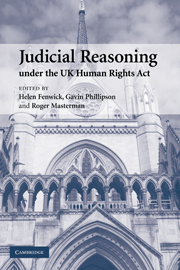Book contents
- Frontmatter
- Contents
- List of contributors
- Foreword
- Preface and acknowledgments
- Table of cases
- Table of legislation
- Table of treaties
- 1 The Human Rights Act in contemporary context
- PART I The interpretation of the Human Rights Act 1998
- PART II The Human Rights Act and substantive law
- 9 The common law, privacy and the Convention
- 10 Judicial reasoning in clashing rights cases
- 11 Family law and the Human Rights Act 1998: judicial restraint or revolution?
- 12 Article 14 ECHR: a protector, not a prosecutor
- 13 Criminal procedure, the presumption of innocence and judicial reasoning under the Human Rights Act
- 14 Concluding remarks
- Index
12 - Article 14 ECHR: a protector, not a prosecutor
Published online by Cambridge University Press: 30 October 2009
- Frontmatter
- Contents
- List of contributors
- Foreword
- Preface and acknowledgments
- Table of cases
- Table of legislation
- Table of treaties
- 1 The Human Rights Act in contemporary context
- PART I The interpretation of the Human Rights Act 1998
- PART II The Human Rights Act and substantive law
- 9 The common law, privacy and the Convention
- 10 Judicial reasoning in clashing rights cases
- 11 Family law and the Human Rights Act 1998: judicial restraint or revolution?
- 12 Article 14 ECHR: a protector, not a prosecutor
- 13 Criminal procedure, the presumption of innocence and judicial reasoning under the Human Rights Act
- 14 Concluding remarks
- Index
Summary
Introduction
When the Human Rights Act 1998 (HRA) brought the protections of the European Convention on Human Rights (ECHR) into UK law, it entrusted the judiciary with a role with which it had little experience. The HRA asks judges to decide, among other things, whether a notional boundary line defining the outer limits of an individual's portfolio of rights has been crossed by a government measure. The judiciary must determine whether these rights have been encroached upon – even by Parliament – by looking at the impact of state action on an individual or group. By contrast, in exercising judicial review functions, the domestic courts have traditionally focused on whether the actions and decisions of government entities and officials – but generally not Parliament – complied with limits imposed on their conduct. Typically, what has happened to the plaintiff, grievant or victim comes into play only with regard to fashioning a remedy, and could never impugn the acts of Parliament itself. Under the HRA, on the other hand, the negative effect of a statute upon a claimant can form the entire basis for a claim.
This new role for the domestic judiciary could hardly have failed to make judges uncomfortable.
- Type
- Chapter
- Information
- Judicial Reasoning under the UK Human Rights Act , pp. 348 - 376Publisher: Cambridge University PressPrint publication year: 2007



